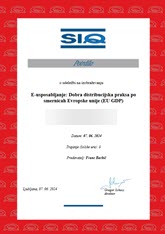|
| The credibility of measurement results and control of processes and costs are key for the successful and efficient operation of any laboratory. In order to apply the right and effective approaches in your laboratory to ensure appropriate quality of operation and results, we invite you to 10 online intensive training sessions. |
| What do you gain by attending the e-School on Quality for Testing Laboratories? Practical knowledge as a process specialist in a (bio)chemical and physical test laboratory on:
|
Program
| 1. Introduction to the e-School on Quality for Testing Laboratories, analytical (measurement) procedure, measurement traceability, and reference materials The participants are introduced to the school and analytical (measurement) procedure and measurement traceability in chemistry and beyond. Together, we will look for answers to the following using practical examples:
|
| 2. Validation, internal quality control (use of control charts) and interlaboratory comparisons With the help of practical examples, the participants learn about approaches to validating analytical procedures, preparation and interpretation of control charts and the basics of interlaboratory comparisons. Only properly validated analytical procedures can be used in the laboratory. The following questions will be addressed:
Validated analytical procedures must be adequately controlled as part of regular internal quality control. For this purpose, we often use control charts with which we visually display and monitor performance of an analytical procedure. The data can also be used to evaluate measurement uncertainty. Together we will discuss answers to the following questions:
|
| 3. Measurement uncertainty and confirmation of project task titles With the help of practical examples, the participants learn about approaches and ways of evaluating measurement uncertainty. We guarantee the credibility and reliability of analytical results through appropriate evaluation of measurement uncertainty. The following questions will be addressed:
|
| 4. Exchange of good practices and presentation of project tasks
|
Working method
The school is dominated by active methods of work. Study cases are discussed and analyzed. During individual sections and parts, the participants solve exercises based on examples from their practice, following the lecturer's instructions.
To participate in e-learning, you need a device with Internet access (computer, tablet, smartphone), a camera and a microphone.
Project work
E-training is individually tailored, as each participant determines the content of the project assignment from their field of work with the help of the lecturer at the beginning of the school. The project work is an added value to the laboratory and the organization in the form of a solution to an individual problem or challenge at your work. The participants present their projects on the final day.
Duration
E-training consists of four sections. Each section contains three consecutive workshops of three academic hours, except for the last section, which ends after the presentation of the final assignments. Throughout the course, the participants are required to complete a project assignment with the help of the lecturer's interactive support.
 | Lecturer Nineta Hrastelj, is a Doctor of Chemical Sciences. She has many years of experience in analytical chemistry, chemometrics and metrology, both at home and abroad, in private and public accredited research laboratories. She has been engaged in introducing quality management systems to analytical laboratories in different roles, i.e. from accreditation and laboratory management. She is the editor of four books on this topic and author of numerous scientific, professional, and popular articles and chapters. Since 2011, she has been the General Secretary of the European Chemical Society (EuChemS). |
 | You will receive a certificate of successful completion of the program upon finishing the training. |
| E-Training will take place in a live online e-classroom. Up to two days beforetraining registered participants will receive a link to the online training. Participants need a computer with a microphone and a camera, as well as access to a reliably functioning internet connection to participate in online training without interruption. |
Additional information: Jana Žabkar, e-mail: jana.zabkar@siq.si
-
/
Collecting applications - Duration: 10 Days
- Registration fee: 1595,00 EUR (does not include VAT)
We value and reward your loyalty
That is why we are introducing the Loyalty Bonus to reward our loyal participants.
More about loyalty bonus